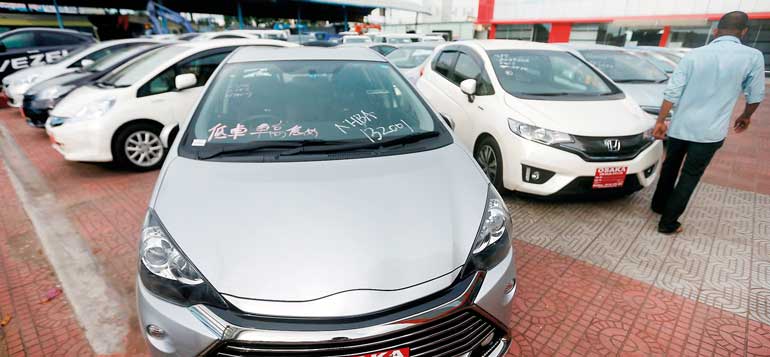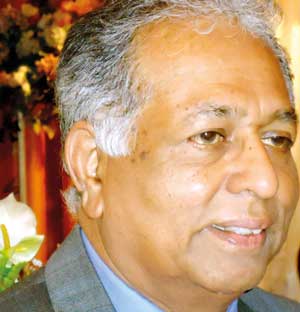Tuesday Feb 17, 2026
Tuesday Feb 17, 2026
Monday, 30 May 2016 00:00 - - {{hitsCtrl.values.hits}}
 By Ranjith Hettiarachchy
By Ranjith Hettiarachchy
In Sri Lanka vehicle imports can be considered the most talk about subject while also being the most duty revised item. As some will recall, there was even a period when motor car imports were entirely banned.
 At the time, vehicles were imported only as a gift by a person earning abroad or by a professional enjoying a long stay in a foreign country. In the 1960s we adopted similar procedures to save valuable foreign exchange.
At the time, vehicles were imported only as a gift by a person earning abroad or by a professional enjoying a long stay in a foreign country. In the 1960s we adopted similar procedures to save valuable foreign exchange.
Gradually these drastic measures were eased and the importation of used or reconditioned cars was allowed. Professionals and government officers were also allowed to import vehicles with a duty permit. Additionally, the most privilege citizens in Sri Lanka, politicians, were granted duty-free car imports. Although they were not allowed to transfer ownership, it as an open secret in Sri Lanka that some of those vehicles were never used by the importer but became a very good income-generating measure.
This restriction was also suddenly removed and permits were even advertised openly in the classified pages. Why have we enforced all kind of restrictions on vehicle imports? If it is to save our hard-earned foreign exchange then this motive was never achieved.
In the 1960s the Indian rupee was lower than the Sri Lankan rupee and the Thai Baht was more or less on par with the Sri Lankan rupee. Today our rupee has depreciated significantly against all the world’s currencies. The only time we managed to get good value for the Sri Lankan rupee was during the time of the tsunami. This was not due to any good governance or improved financial management but because of the inflow of foreign currency to Sri Lanka as aid.
All of the above proves that we have failed to efficiently manage our foreign currency. The measures adopted by every government and the private sector have failed to establish industries that can bring in foreign exchange.
The vehicle import policy has created so many other issues which are not taken into serious consideration. Even middle class citizens wish to become an owner of a vehicle. The main reason is our public transport system has failed to deliver the comfort, speed and safety we require when travelling. In addition, due to an increase in vehicle users another major issue has been created. Other than the two highways, the average speed on Sri Lankan roads has dropped to 40 km/h in outstation areas and in Colombo it has plummeted to 7-8 Km/h.
What are the main reasons for this? Is it because our roads are packed with three wheelers? Is it due to the absence of a proper school transport system? Is it due to poor road discipline? Is it because our roads are too narrow to handle the heavy traffic?
Why are there so many school vans in operation in Sri Lanka? Without question this is due to the complete collapse of the formerly efficiently-operated CTB school service. Now the school van operation has become another service industry. None of the politicians will be keen to disturb this “volume of voters“.
The absence of an economical transport system has had an adverse effect on the middle class. Although parents think it is necessary investment in order to provide a better education for the next generation, this is definitely a mistake. It is a waste of their hard-earned money due to the poor management of the public transport system.
In addition, due to the direct ‘doorstep to school’ concept, our kids have lost a healthy activity in walking. This is a very serious issue created by all the politicians who have ever governed this country.
As public transport has dived deeper into the doldrums, three wheelers have emerged on the road in full force. Three wheeler imports have definitely affected our foreign exchange reserves. Furthermore, they have created new jobs that do not contribute in any manner to the growth of the country.
How have other countries with their positive-thinking politicians and think tanks resolved this issue?
Singapore
Everyone knows that Singapore, although being a very small country, has improved the mobility of their citizens. Cars are sold through a permit system where they are auctioned to restrict vehicle usage and additional income is also generated through this restriction. Most probably the permit cost can go above the value of the vehicle. Some roads are completely banned for single-passenger vehicles. The next best option adopted by most of the developing and developed countries is creating a strictly-controlled ‘bus lane’. This measure has provided a speed edge over motor cars. So the above mentioned measures cannot be compared with the sky train, Metro and underground rapid transport. These measures can be easily adopted to suit our purse. Will any policymaker once again move towards creating an efficient school bus service? The answer is a big no. The reasons are because such actions would affect a ‘vote bank’.
Due to all of the above, the governments thought the best medicine was to revise the duty of imports from time to time in a haphazard manner. When you consider the above facts anyone will realise that this is how all the governments have covered the inefficiency of their long-term planning.
Now it has become a very regular point of fiscal policy to enact changes on the import of vehicles. With the revision of duty, all importers get together and clamor for the downward revision of duty. In one way it is reasonable. Any middle income earner who wishes to become an owner of a vehicle with their limited resources can import a vehicle. At the end when the vehicle arrives in our port the duty has reached beyond his purse. So it is natural for car importers to always hang around our Treasury after duty revisions.
Why not introduce cut-off points on implementing the revisions. If the LC is established and even the vehicle is loaded onto a steamer before the specified date of revision, allow such imports at the old duty rates. This will be some good news especially to middle income groups.
Finally we have to realise that the time has come to adopt a long-term policy on vehicle imports while concurrently developing our roadways to match the facilities that exist in our neighboring countries. The increase and decrease of the duty rates of vehicles will not be a wise decision at all.
I wish to end this article by quoting a very popular political comedian. “My father said, ‘Son now we are on our way to becoming a developing country.’ Even I told the same story to my son and very soon my son will tell the same thing to his son. So this will keep on going if we do not become wise and plan our future.”
(The writer is the Past Chairman of the Ceylon National Chamber of Industries (CNCI) and can be contacted at [email protected])